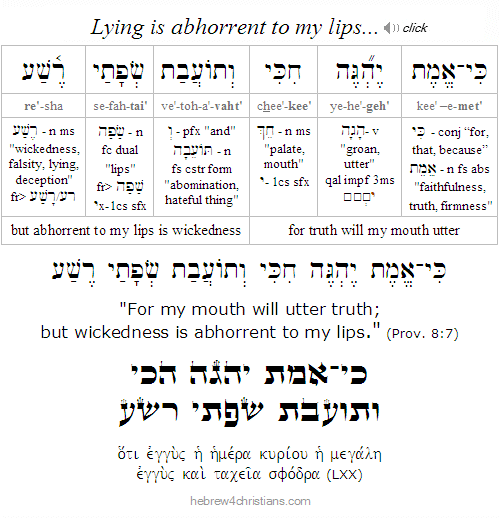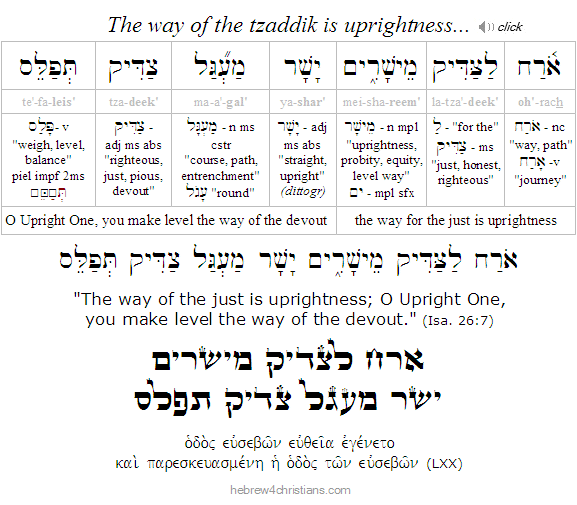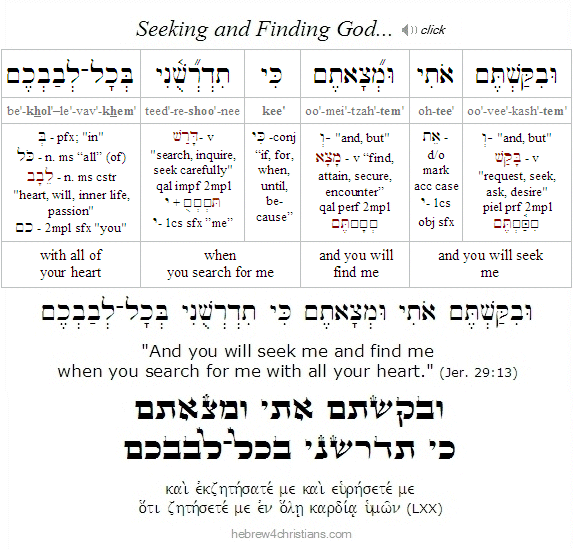|
July 2021 Updates (continued)
Note: If any page content appears to be missing, please refresh the page...
The Journey of journeys...
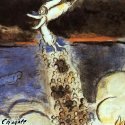
[ The following is related to our Torah portion for this week, parashat Masei... ]
07.05.21 (Tammuz 25, 5781) From our Torah portion this week (i.e., Masei) we read: "These are the journeys of the people of Israel (מַסְעֵי בְנֵי־יִשְׂרָאֵל) who went out of the land of Egypt..." (Num. 33:1). The sages ask why the word "journeys" (plural) was used here, since only the first journey – from Rameses to Sukkot – literally marked "yetziat mitzrayim," the going out of Egypt – and the other journeys were outside of Egypt, in the desert. They answer that the journey out of Egypt goes beyond the physical land into the spiritual - an exodus from captivity to the world into the realm of the spirit. As has been said, it took the LORD 40 days to get Israel out of Egypt, but it took 40 years to get Egypt out of Israel... The "journey out of Egypt" is therefore a journey of smaller journeys that leads to the full consciousness of deliverance.
Along the way we are repeatedly tested. The "desert experience" reveals what is hidden in our hearts... The murmuring and rebellion of the Israelites in the desert is our own, and our challenge is to find healing from our fears. Anger, doubt, boredom, cravings, and outright rebellion are symptoms of a deeper problem, and to change we must first confess our inner poverty, neediness, and emptiness (James 5:16). When we stop making excuses we can learn to trust in God's provision for our lives; we will taste of the heavenly manna and be satisfied; we will be delivered from our fears by be filled with God's love. The impulses that sought to lead us away from God will no longer be able to pretend to be the truth, since God's peace and love will direct the heart. We will begin to take hold of the promise...
Be encouraged my fellow sojourners walking by faith through the desert of this present world. The Torah uses a repetitious expression, "Sanctify yourselves and you shall be holy" (הִתְקַדִּשְׁתֶּם וִהְיִיתֶם קְדשִׁים) (Lev. 11:44) because when we make an effort -- no matter how feeble at times -- to draw near to the LORD, He will draw near to us... Indeed the walk of faith is one of ascent and descent and ascent again: It's often "two steps forward, one step back..." It is a long road, a process, as we learn to obey and seek to grow closer to God. Authentic repentance doesn't imply that we will never sin or make any mistakes, of course, but rather means that the oscillating pattern of "up, then down, then up" is the basic way we walk. Our direction has changed for good; we have turned to God for life and hope. We now understand our sins in light of a greater love that bears them for us even as we draw ever closer to the One who calls us home...
Hebrew Lesson:
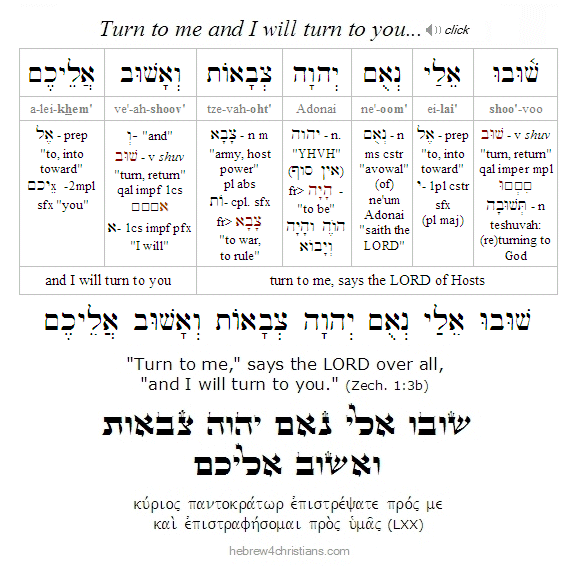 |
Integrity of our Words...

[ Our Torah this week (Mattot) discusses various laws regarding vows and oaths... ]
07.05.21 (Tammuz 25, 5781) "If a person vows a vow (i.e., neder: נֶדֶר) to the LORD, or swears an oath (i.e., shevuah: שְׁבוּעָה) to bind himself by a pledge, he shall not break his word. He shall do according to all that proceeds out of his mouth" (Num. 30:2). The Hebrew expression "break his word" literally means "profane his word" (יַחֵל דְּבָרוֹ), that is, to defile the soul by causing it to be inwardly divided, irresolute, and cowardly. After all, breaking your word means violating the integrity of who you are, showing that what you say and what you do are not unified, and this leads to feelings of shame. Your words confess your reality and bring it to life... If you cannot keep your word, your word becomes profane, empty, lost -- you become a "stranger to yourself," unsure of what you intend. "Let your "yes" be yes and your "no" be no; learn to say what you mean and mean what you say (Matt. 5:37).
In the Book of Proverbs we read, "When words are many, transgression is not lacking, but whoever restrains his lips is wise" (Prov. 10:19). The Chofetz Chaim comments: "When people are preparing a telegram, notice how carefully they consider each word before they put it down. That is how careful we must be when we speak." As James admonishes us: "Let every person be quick to hear, slow to speak, slow to anger" (James 1:19).
Hebrew Lesson:
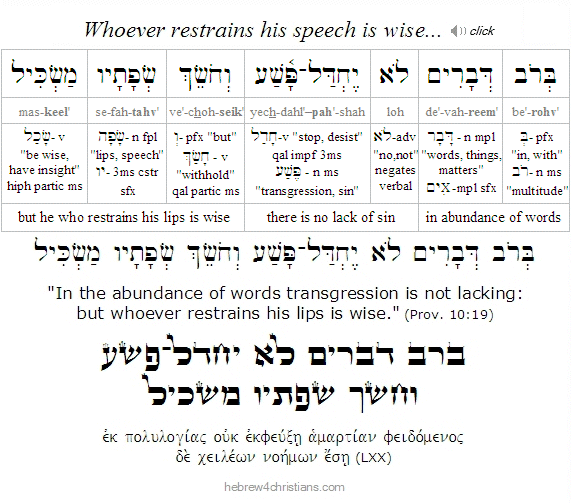 |
Since words represent thoughts, the use of our tongues has to do with how we choose to think... "Think on these things..." We are instructed to "take every thought captive" (αἰχμαλωτίζω, i.e., lead away as a prisoner) to the obedience of Messiah... It is wise to restrain our speech, because, after all, we often have no idea what we are talking about, and therefore our words can become unruly and even dangerous. Whenever we open our mouth to speak, Heaven is listening (Matt. 12:36-37).
The Mystery of Spirit...

07.05.21 (Tammuz 25, 5781) The Hebrew word "spirit" (i.e., ruach: רוּחַ) points to wonder, to something extraordinary and beyond our expectation, that is, to the mysterious Divine Presence that pervades all things yet rises above all things. Yeshua likened the ruach with the inscrutable motions of the wind. He said, "The wind blows where it wishes, and you hear its sound, but you do not know where it comes from or where it goes. So it is with everyone who is born of the Spirit" (John 3:8). We see the effects of the wind, but not the wind itself, which illustrates that the wind surrounds us yet is ultimately beyond our grasp and control. To be "born of the Spirit" is therefore a mysterious intervention from heaven (John 1:13), just as being "led by the Spirit" implies seeing differently, that is, apprehending the Divine Presence in the mysterious motions of life.
אנה אלך מרוחך
ואנה מפניך אברח
a·nah · ei·leikh · mei·roo·che'·kha
ve·a'·nah · mee·pa·ney'·kha · ev·rach

"Where shall I go from your spirit?
Or where shall I flee from your presence?"
(Psalm 139:7)

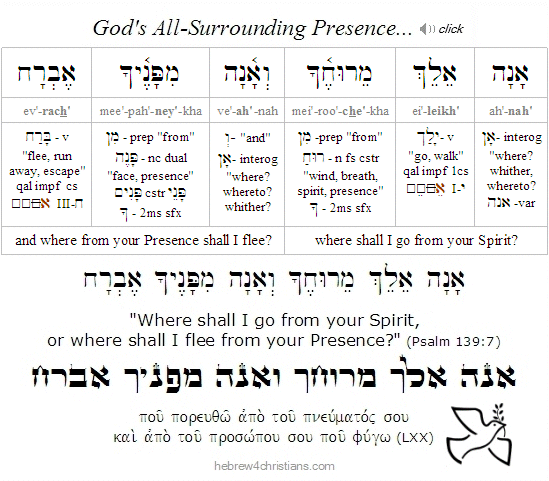
"The wind blows where it will; you are aware of its soughing, but no one knows whence it comes or whither it goes. So also with longing, the longing for God and the eternal, the longing for our Savior and Redeemer. Comprehend it you cannot, nor should you; indeed, you dare not even want to attempt - but you are to use the longing. Would the merchant be responsible if he does not use the opportune moment; would the sailor be responsible if he does not use the favorable winds - how much more, then, is the one who does not use the occasion of longing when it is offered" (Kierkegaard: Discourses). Amen, may the hunger and yearning for the Lord be within you. Amen.
The Central Thing...

07.05.21 (Tammuz 25, 5781) From our Torah portion this week (i.e., parashat Mattot) we read: zeh ha'davar asher tzivah Adonai (זה הדבר אשׁר צוה יהוה), "This is the thing the LORD has commanded" (Num. 30:1). The language here seems to suggest that there is only one matter that God has commanded, namely, to speak truth and to be faithful in our promises (Num. 30:2). This is because the sacredness of our word is the foundation for all our other responsibilities. After all, if our word is equivocal, it is unclear, unreliable, undecided, and therefore ultimately meaningless.... Insincere words are without genuine commitment, and the lack of decisiveness undermines all Torah. זה הדבר אשׁר צוה יהוה - "This is the thing the LORD has commanded," namely, to accept your duty to honor the truth; to keep your faith in God's word; and to hold sacred your commitment before God.
כי־אמת יהגה חכי
ותועבת שׂפתי רשׁע
kee - e·met · ye·he·geh · chee·kee
ve·toh·a·vaht · se·fah·tai · re'·sha

"For my mouth will utter truth;
but wickedness is abhorrent to my lips."
(Prov. 8:7)
Hebrew Lesson
Proverbs 8:7 Hebrew reading (click):
The Sanctity of your Heart...
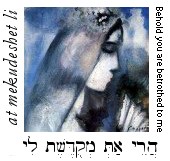
[ The following entry concerns this week's Torah reading, parashat Mattot-Masei... ]
07.04.21 (Tammuz 24, 5781) "Speak to the children of Israel, and say unto them, 'When ye are passed over into the land of promise… drive away all the inhabitants of the land before you; destroy all their carved images, all their molten images, and demolish their high places'" (Num. 33:51-52). The Hebrew term for idolatry is "avodah zarah" (עֲבוֹדָה זַרָה), which literally means strange or "foreign" worship... The worship of anything other than the true God, whether it is pleasure, money, fame, control, security, self-improvement, health, religion, etc., is regarded as foreign, since it alienates us from the truth of reality. We were created to be in relationship with God but we lose sight of this truth whenever elevate what is finite to the status of the infinite. Indeed idolatry is the substitution of what is not-god (לא־אֵל) for the sacred, absolutizing the present and worshiping the temporal. Since our greatest good is found in the eternal verities of the divine communion, the Lord cannot give us an absolute good apart from Him, since there literally is no such thing. "No one can serve two masters," Yeshua said, and "a divided house cannot stand." For our own good, then, God necessarily is the Ultimate Concern of our life, and he wants to spare us the pain, disappointment, and trauma of being double-minded, disintegrated, and full of inner conflict. Spiritual warfare therefore means taking every thought captive before the bar of God's truth, rooting out and destroying all our inner idols so that we can be delivered from the anguish of uncertainty and ambivalence.
What is at stake here is your inner life, or rather the threat of the disintegration of your deepest essence into a fragmented multiplicity without center... The soul must be grounded in Reality or it is lost, dissipated in existential dread and despair. Yeshua said that when your eye is "single" (ἁπλοῦς), your whole being will be full of light (Matt. 6:22), which means that being single-minded and wholehearted unifies and heals the soul.... Being pulled in opposite directions is both painful and debilitating, for there is no overarching reason to direct the will in its decisions. Hating and loving the good is the ambivalence of despair. Being both willing and unwilling weakens the soul, but seeking the good and making God your ultimate concern binds up the broken heart and centers the will. "Your faith has made you whole..."
"Keep your heart with all vigilance, for from it flow the springs of life" (Prov. 4:23). The heart, that is, the willing and desiring center of the self, is to be proactively guarded, and for this sacred task God offers us heavenly comfort and resolve. Courage does not chase away or deny fear and despair, but instead gives us determination to persevere despite these feelings. "Why are you cast down, O my soul, and why are you in turmoil within me? Hope thou in God" (Psalm 42:11). Courage expresses hope in the midst of the struggle; it finds strength to confront pain, danger, or grief with God's help. Courage is grounded in the decision to trust that God is with us, despite our circumstances or feelings of abandonment. How you choose to guard your heart from the corruption and hardness of the world will determine the "road" of your life. If you do not care to keep your heart open and soft, you will become cynical, weary, and more and more selfish. Your way will be lonely, suspicious, and dangerous. If, however, you keep yourself from the hardness of unbelief, you will experience compassion, encouragement, and the joy of loving others.
Hebrew Lesson:
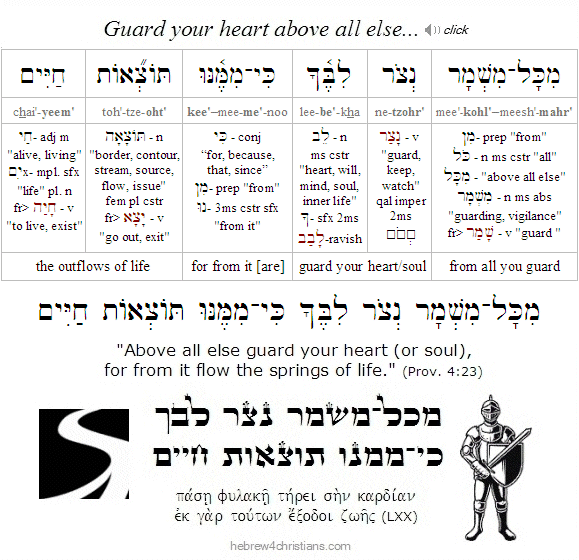 |
This Week's Torah:
Parashat Mattot-Masei...
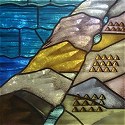
07.04.21 (Tammuz 24, 5781) Shavuah Tov, chaverim! This week we read a "double portion" of Torah that will conclude Sefer Bamidbar, or "the Book of Numbers." Our first Torah portion, called parashat Mattot (מַטּוֹת, "tribes"), begins with the LORD giving laws and prohibitions regarding the making of vows (nedarim). After this, the Israelites were commanded to wage war against the Midianites for seducing the people to sin at the incident of "Baal Peor." During the ensuing battle, the wicked sorcerer Balaam was killed, as well as five tribal kings of the land of Midian. The tribes of Reuben and Gad (and half of the tribe of Manasseh) then asked permission to settle in the pasture land of Gilead (on the east of the Jordan), since they had large herds of cattle. At first Moses hotly disapproved of their request, since he feared that the other tribes would lose heart if these tribes stayed behind during the conquest of Canaan. However, when the tribal leaders made a vow to join the fight while their families remained in Gilead, Moses finally agreed.
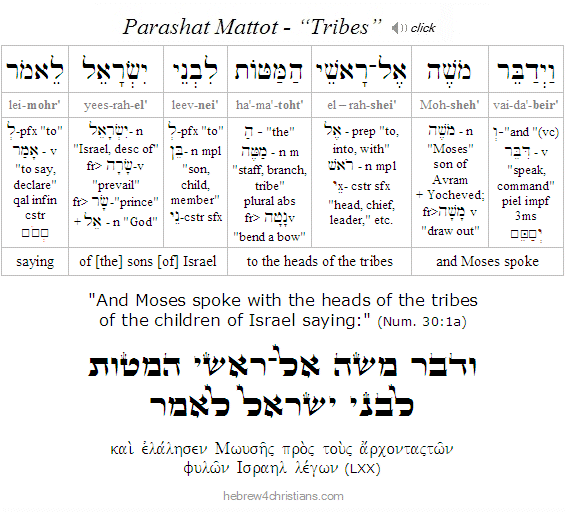 |
In our second Torah portion, called parashat Masei (מַסְעֵי, "journeys"), Moses recounted the various "stations" of the journey, and instructed that when the people crossed the Jordan into the land of Canaan, they were to drive out all the inhabitants and to utterly destroy all traces of their culture and religion. After this, the land would be divided by lot according to tribes of Israel, based on the size of each tribe. God then warned Moses that if the Israelites would not drive out the inhabitants of the land, they would become a "snare" to them, and God would then judge and exile the Israelites as he intended to do to the Canaanites.
The Israelites were then instructed to assign towns with surrounding pasture lands to the Levites. There were to be a total of 42 towns, chosen by lot and distributed throughout the land according to the size of each tribe. In addition, six more cities were to be given to the Levites and designated as "cities of refuge" to which a person who unintentionally killed another may flee to take refuge from an "avenger of blood" (i.e., next of kin). The death penalty required testimony from at least two witnesses and admitted of no "ransom" (plea bargain) to be offered in place of the murderer's execution. On the other hand, a person responsible for involuntary manslaughter of another was required to dwell within the confines of a city of refuge until the death of the High Priest, after which time he was free to return to his home without fear of retribution from an avenger of blood.
The Book of Numbers – and the historical narrative of the Torah itself – concludes with the resolution of the question of legal inheritance in the land just before Joshua would lead the people into the land of Canaan. The book ends with this statement: "These are the commandments and the rules that the LORD commanded through Moses to the people of Israel in the plains of Moab by the Jordan at Jericho."
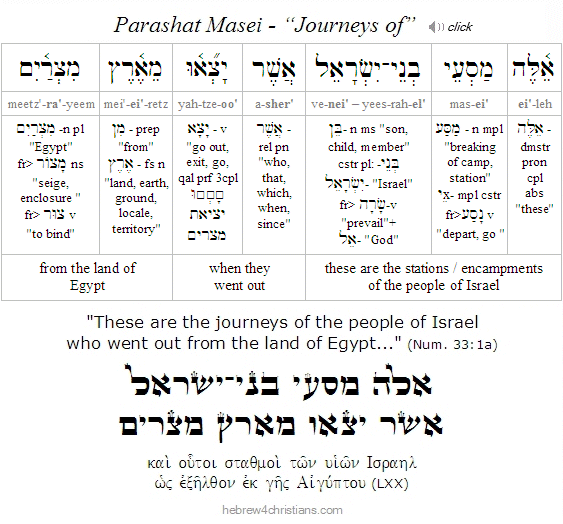 |
Resources:
Torah of Empathy...

07.02.21 (Tammuz 22, 5781) There is an old Chassidic story of two men sitting and enjoying a drink together. One of them then says to the other, "You know, you're my best friend. I really love you, brother!" The other man responds, "Oh yeah? If you really love me, tell me where I hurt..."
The point of this simple story is that we can't really say we love someone without taking the time to know them -- and that means knowing how they suffer. Most of us are afflicted, of course, but are we able to transcend our own pain to genuinely empathize with others? Conversely, how many people do we trust enough to to confide our own pains and heartaches? The Law of Messiah (תוֹרת המשׁיח) is to bear one another's burdens (τα βαρη, "weights," Gal. 6:2), and that means making ourselves vulnerable -- and making room inside our hearts for the vulnerability of others. James the Righteous tells us that personal healing comes from confessing outwardly (εξομολογεισθε) our sins (τας αμαρτιας) to one another so that we may be healed (James 5:16). Of course it is humbling to acknowledge our sins, our failures, and our hurts to another person, but without an audience for the inner voice of our pain, we suffer all the more...
If someone loves us, they will know "where we hurt"; and if we love them, we will know where they hurt, too. This same principle can also be applied to our relationship to Yeshua... We take comfort that Yeshua sticks closer to us than a brother, praying for us and "knowing where we hurt." But if we say that we love him, are we are not claiming that we know "where he hurts?" Does Yeshua suffer today? The Apostle Paul wrote: "Now I rejoice in my sufferings for your sake, and in my flesh I am filling up what is lacking in Christ's afflictions for the sake of his body, that is, the church" (Col. 1:24). What is "lacking in Messiah's afflictions" is our present sacrifice for the sake of others... Yeshua hungers with those who are hungry, thirsts with those who are thirsty, feels loneliness with those who are abandoned, shivers with those who are cold, weeps with those who are forlorn, is imprisoned with those who are incarcerated, is sick with those who are ill, and so on (Matt. 25:31-ff). Yeshua feels the pain of even the "least of these my brothers." This is where he hurts, chaverim, and he calls to us to extend his compassion to others.
The essential difference between the righteous and the unrighteous is revealed in their response shown to those in need. After all, on the Day of Judgment, both the righteous and the unrighteous will account for their choices in light of the selfsame needy and pain-riddled world. The destiny of each person will be determined by whether he or she took the time to genuinely engage the suffering of others. May the LORD help us to share His heart and passion for a lost and hurting world. Amen.
Hebrew Lesson:
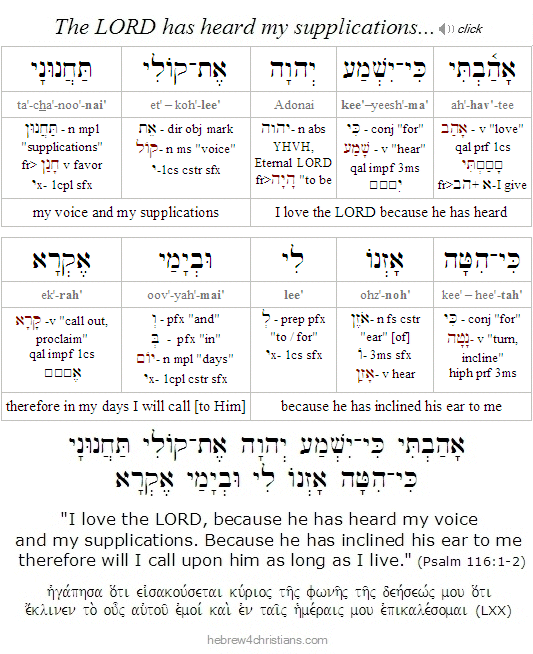 |
Spirit and Truth...
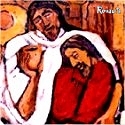
07.02.21 (Tammuz 22, 5781) Yeshua told his followers that the Kingdom of God (i.e., mamlekhet Adonai: ממלכת יהוה) is "within you" (Luke 17:21). This teaches us that the reign of the Spirit is not to be found "out there" nor is the kingdom to be regarded as a political structure of this world, but is realized in spiritual relationship - namely, the communion between the LORD God with your heart and your heart with the LORD God... This is the deeper meaning of the Shema: "God is Spirit (Πνεῦμα ὁ θεός), and those who worship him can do so only in spirit and truth" (John 4:24).
When we learn to believe clearly, Yeshua says we can experience the divine Presence within our hearts and among ourselves. As we turn to God, may we recognize that who we are is more vital than our outer appearance and contingent circumstances. Life in the kingdom means having a new identity, being a new creation (בְּרִיָּה חֲדָשָׁה), and that changes everything (2 Cor. 5:16-17). The "circumcised of heart" worship God in the spirit and rejoice in Yeshua the Messiah, having no confidence in the flesh (Phil. 3:3).
Hebrew Lesson:
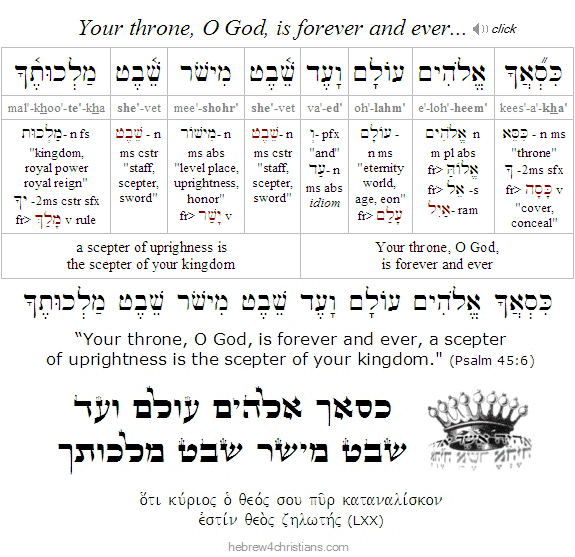 |
Believing and Being...
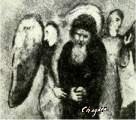
07.01.21 (Tammuz 21, 5781) It is written: "By the grace of God I am what I am" (1 Cor. 15:10), though this truth provides no excuse for resignation or passivity, but instead realizes the call to walk in the power of the divine life - to press on to be who God says you are and to forget things that are behind... By the grace of God "I am," just as God gives life to me, and in that grace so am I reborn, made new, and at peace...
He Gives Greater Grace...

07.01.21 (Tammuz 21, 5781) "For though the LORD is exalted, He regards the lowly, but the haughty He knows from afar" (Psalm 138:6). Yea, God opposes the proud but gives grace to the humble (James 4:6). And who are the humble but those keenly aware of their own nothingness - the despised, the needy, and the rejected of men? The LORD justifies the ungodly by faith; He hears their cry for deliverance "from the depths"; he creates them anew yesh me'ayin, "out of nothingness," by making them into a "new creation" (בְּרִיאָה חֲדָשָׁה) through the agency and power of the Holy Spirit (Rom. 4:17; 2 Cor. 5:17). O praise Adonai Oseinu, the LORD God our Maker, for he looks upon the lowly, he is near to nishberei lev, the brokenhearted, and he binds up their wounds...
כי־רם יהוה ושׁפל יראה
וגבה ממרחק יידע
kee - rahm · Adonai · ve·sha·fahl · yeer·eh
ve·ga·vo'·ha · mee·mer·chak · ye·yei·da

"For though the LORD is exalted, He regards the lowly,
but the haughty He knows from afar."
(Psalm 138:6)

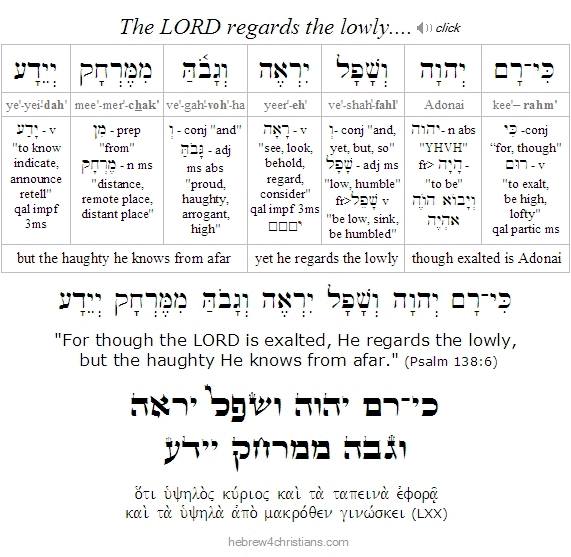
Just as the LORD made the world yesh me'ayin, "out of nothing," so His creative power continues unchanged. God is able to take a dead heart, a heart of stone, and make it tender and soft through the breath of His Spirit... Therefore His eyes look upon the lowly, the humble, the poor in spirit, but He disregards those who lift themselves up in pride.
Indeed, the LORD resists the proud and repays their scorn with scorn: "With the scorners he is scornful, but to the lowly he gives grace" (Prov. 3:34). Those who mock the idea of sin and arrogantly exalt themselves will be held in derision, but of those who find grace it is written, "Blessed is the man who walks not in the counsel of the wicked, nor stands in the way of sinners, nor sits in the seat of scoffers, but his delight is in the Torah of the LORD, and in His Torah he meditates day and night" (Psalm 1:1-2). It is a severe mercy, a weighty grace, that is bestowed to us, friends...
The Breath of Life...
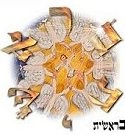
07.01.21 (Tammuz 21, 5781) A verse from this week's Torah (i.e., parashat Pinchas) reveals another great Name of God: Elohei ha'ruchot le'khol basar (אלהי הרוחת לכל־בשׂר), which can be translated "the God of the breath of all flesh" (Num. 27:16). This Name reveals that the LORD is the Source of your breath, the One who exhales to you nishmat ha'chayim (נשימת החיים), the "breath of life" that enables you to live (Job 12:10). The sages use the analogy of a glassblower who creates a glass vessel. Just as the glassblower blows into a tube to form a vessel from molten glass, so the "breath" (i.e., neshamah: נְשָׁמָה) that comes from the LORD functions as spirit (i.e., ruach: רוּחַ) that forms and fills the human soul (i.e., nefesh: נֶפֶשׁ). Note especially that the Name YHVH (יהוה), the LORD, first appears in this connection (Gen. 2:7), a designation that also means "God is Present" (Exod. 3:14) and "God is Mercy" (Exod. 34:6-7). Note also that each letter of the Name YHVH represents a vowel sound (i.e., breath), suggesting that God's Spirit is as close as your very next breath. Like the wind that cannot be seen, so is the spirit the essential part of your identity. Truly in God we "live and move and have our being" (Acts 17:28).
Hebrew Lesson:
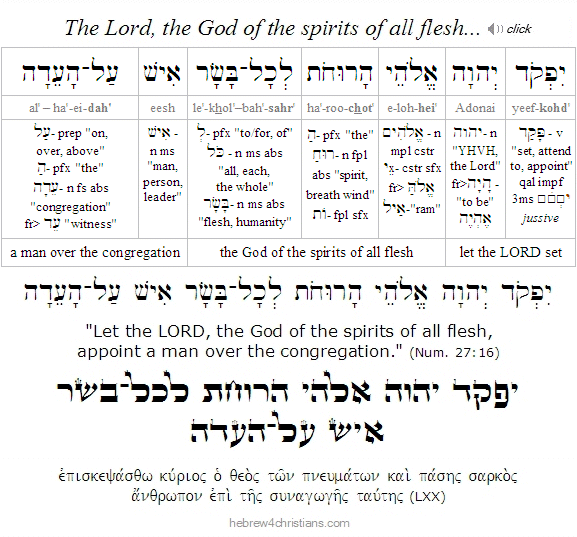 |
Seeking and Finding God...
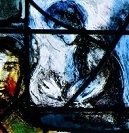
07.01.21 (Tammuz 21, 5781) Some people imagine spirituality as a climb upward, an "ascent of the soul" that aims to reach God through the performance of good deeds or religious rituals. But God does not say "at the end of the way you will find me," but rather, "I AM the way, the very road under your feet, the Place (הַמָּקוֹם) where you are, the Bridge to the Father (John 14:6). "For all things come from You (כִּי־מִמְּךָ הַכּל), and from your hand we give to you" (1 Chron. 29:14). The LORD is Present in every "here" and every "now," the Source of all we are. And no matter what our circumstances, we will find God if we search "bekhol levavkha" - with all our being, as it is written: "You will seek me and find me, when you search for me with all your heart" (Jer. 29:13).
It's the question the heart must ask: "Is it really true? Does God care for me? Do I belong to Him? Am I safe in His presence?" etc. Just imagine! What if everything you say you believe was really something you earnestly believed? What difference would that make in your life?
Hebrew Lesson:
<< Return
|
|


















